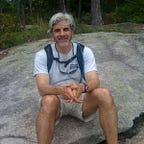The Simulation Chamber
Cowards die many times before their deaths;
The valiant never taste of death but once.
Of all the wonders that I yet have heard.
It seems to me most strange that men should fear;
Seeing that death, a necessary end,
Will come when it will come.
― William Shakespeare, Julius Caesar
A simulation is an attempt to replicate a real-world situation in order to gain insight for training, designing, modeling, or researching. They are often used when the real-world process cannot be encountered directly due to threatening conditions, inaccessibility, lack of appropriate resources, or in many other situations where to do so is impossible or unacceptable. Simulation is something the human mind does quite well — sometimes too well.
On September 12, 1962, President Kennedy delivered his “We choose to go to the moon” speech to persuade the American people to support NASA’s effort to fly a manned mission to the moon. Only a creature capable of great imagination would even consider this endeavor and only one with the ability to simulate could pull it off. On the third mission to put a man on the surface of the moon (Apollo 13), the survival of the pilots, following an explosion in space, can be attributed in large part to the ground crew’s ability to simulate and find solutions to the problems the flight crew was facing. The 1995 movie, Apollo 13, depicts the grounded crew member, Ken Mattingly (played by Gary Sinise), working diligently in a Lunar Module simulator to solve the problem of how to do a space-based power up of the Command Module that would avoid shorting out the electrical systems. The “successful failure” of Apollo 13 was described by some as NASA’s finest hour, and it was a clear example of the power of the mind’s ability to simulate.
Looking through a natural selection lens, we can appreciate how ancestors, who had a greater ability to simulate, and thus, anticipate a lethal threat or engage complex social relationships, would leave more offspring than their counterparts. In a dangerous world, it is better to make a Type I error, thinking the rustling grass is a predator when it isn’t (false positive), than the Type II error, thinking there is not a predator when there is one (false negative). Too much simulation, however, and our ancestors might never have left their caves. There was a place for the “cowards” and the “valiant” in our history, and both have passed on their genes.
Mental simulations are an essential component of being a social species. The ability to anticipate others’ reactions helps to guide our behavior. In contemporary society, our simulating minds often become carried away with “what if” simulations. “What if-ing” is a popular activity of the wandering mind. Balance is called for because mental simulations pull our emotions along with them, giving us jolts of anxiety, fear, anger, jealousy and a host of other negative and/or positive emotions. Most of us have already died “many times” in our effort to avoid Type II errors. The worrying mind is not aided by the massive amounts of risk assessment information now instantly available to warn us of the dangers that we face in every area of our lives. Perhaps the biggest challenge is the extent to which we become so immersed in our simulations that we forget that we are even running a simulation. This leads to believing the results of these simulations as if they were prophecies. Swept up in our dark imaginings, life becomes almost uninhabitable.
Ironically, much of our suffering springs from our efforts to resist difficulty, pain, and even death. Shakespeare’s Caesar seems to advise less resistance and a more accepting frame of mind. This involves spending more time being with “what is” and that means looking “at” our simulations rather than looking “from” them. More clearly seeing mental simulations for what they really are, means spending a lot less time suffering and dying.
John R. Lucy, Ph.D. is a psychologist in private practice at Decatur Psychology, LLC.
